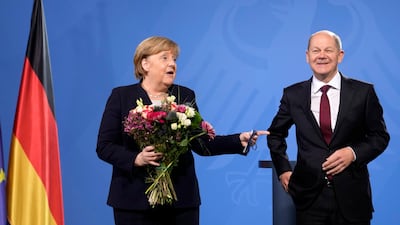Germany dismissed warnings that Russia could use its gas pipelines as a weapon just four months before the invasion of Ukraine, declassified papers reveal.
A report drawn up by officials in October 2021 said the Nord Stream 2 pipeline would increase Europe’s energy security rather than threatening it.
The undersea pipeline never went into operation after Chancellor Olaf Scholz withdrew the report in February.
But it makes awkward reading in hindsight after Russia’s gas cuts proved Germany’s confidence was misplaced.
The 54-page report was produced in the final weeks of Angela Merkel’s government, in which Mr Scholz served as finance minister.
Although German officials took soundings from Poland, Lithuania and other countries who feared Russia’s intentions, they saw no reason to block the pipeline’s certification.
“Gas deliveries from the Soviet Union and later Russia to Germany have taken place reliably and as per contract for decades, including in times of political tension,” the report said.
Officials said Russian exporter Gazprom, and the other co-owners of Nord Stream 2, had “no economic interest” in stopping exports to Germany.
As it proved, Gazprom did cut supplies to Germany on the parallel Nord Stream 1 route. Russia cited technical reasons that western powers saw as spurious.

The resulting energy crisis has prompted a scramble to diversify supplies, with ministers in Mr Scholz’s government expressing regret that Germany became so reliant on Moscow.
However, the report shows Germany was arguing only a year ago that Nord Stream 2 would diversify supplies by linking western Europe to new gas fields in Russia’s north.
Germany said at the time that it sympathised with the worries of Poland and others who said Russia could use Nord Stream 2 to pressure its neighbours.
But Germany said they had not shown any concrete evidence for their concern that Gazprom would cut supplies.
Ukrainian President Volodymyr Zelenskyy also opposed the pipeline, which bypasses Ukraine and was projected to cost the country $2 billion a year in transit fees.
He warned in August 2021 that Russia could deliberately cut supplies in the gas market in order to raise the price.
Nevertheless, the German report concluded: “The Nord Stream 2 pipeline represents additional capacity for the energy security of the EU and its member states, including Germany.
“Granting certification does not endanger the security of gas supply for Germany or the European Union.”

The assessment by Germany’s Economy Ministry was handed to regulators last October, clearing the way for them to approve the pipeline.
In the event, approval was delayed for technical reasons, then put on ice indefinitely when Mr Scholz rescinded the report in February, two days before the invasion of Ukraine.
The document was declassified this week after pressure from German media organisations to release it.
It came after parts of Nord Stream 2 and the parallel Nord Stream 1 were apparently put beyond use by mysterious explosions under the Baltic Sea last month.
The blasts appeared to have put the Nord Stream route beyond use for the time being, except for one of the two pipes that makes up Nord Stream 2.
Russian President Vladimir Putin said this week that the remainder of Nord Stream 2 could still be switched on, but Germany said it would not take up his invitation.


